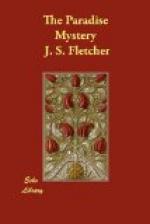“Yes,” he said. “There maybe something in your suggestion. They certainly did take his word without inquiry. It’s true —he mightn’t be what he said he was.”
“Aye, and from what I read, they never followed his movements that morning!” observed Glassdale. “Queer business altogether! Isn’t there some reward offered, doctor? I heard of some placards or something, but I’ve never seen them; of course, I’ve only been here since yesterday morning.”
Bryce silently drew some papers from his pocket. From them he extracted the two handbills which Mitchington had given him and handed them over.
“Well, I must go,” he said. “I shall no doubt see you again in Wrychester, over this affair. For the present, all this is between ourselves, of course?”
“Oh, of course, doctor!” answered Glassdale. “Quite so!” Bryce went off and got his bicycle and rode away in the direction of Wrychester. Had he remained in that garden he would have seen Glassdale, after reading both the handbills, go into the house and have heard him ask the landlady at the bar to get him a trap and a good horse in it as soon as possible; he, too, now wanted to go to Wrychester and at once. But Bryce was riding down the road, muttering certain words to himself over and over again.
“The left jaw—and the left hand!” he repeated. “Left hand —left jaw! Unmistakable!”
CHAPTER XXII
OTHER PEOPLE’S NOTIONS
The great towers of Wrychester Cathedral had come within Bryce’s view before he had made up his mind as to the next step in this last stage of his campaign. He had ridden away from the Saxonsteade Arms feeling that he had got to do something at once, but he was not quite clear in his mind as to what that something exactly was. But now, as he topped a rise in the road, and saw Wrychester lying in its hollow beneath him, the summer sun shining on its red roofs and grey walls, he suddenly came to a decision, and instead of riding straight ahead into the old city he turned off at a by-road, made a line across the northern outskirts, and headed for the golf-links. He was almost certain to find Mary Bewery there at that hour, and he wanted to see her at once. The time for his great stroke had come.
But Mary Bewery was not there—had not been there that morning said the caddy-master. There were only a few players out. In one of them, coming towards the club-house, Bryce recognized Sackville Bonham. And at sight of Sackville, Bryce had an inspiration. Mary Bewery would not come up to the links now before afternoon; he, Bryce, would lunch there and then go towards Wrychester to meet her by the path across the fields on which he had waylaid her after his visit to Leicestershire. And meanwhile he would inveigle Sackville Bonham into conversation. Sackville fell readily into Bryce’s trap. He was the sort of youth who loves to talk, especially in a hinting and mysterious fashion. And when Bryce, after treating him to an appetizer in the bar of the club-house, had suggested that they should lunch together and got him into a quiet corner of the dining-room, he launched forth at once on the pertinent matter of the day.




